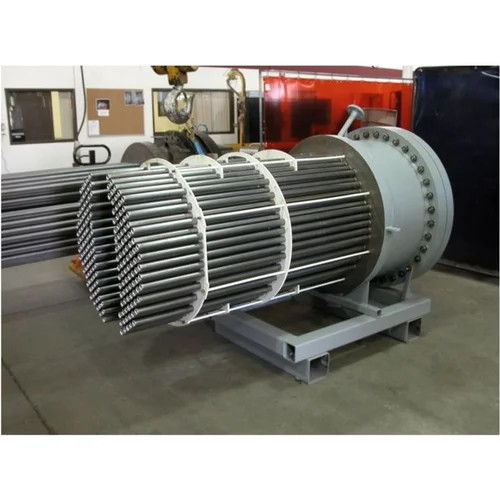Stainless Steel Vapor Condenser is a high-performance heat exchange device designed to condense vapor back into liquid form. The core function lies in removing latent heat from the vapor and transferring it to a coolant (commonly water, air, or glycol mixtures). While condensers are used in countless industries, the stainless steel variant is specifically engineered for corrosive, high-purity, or regulated applications.
Unlike condensers made from copper or carbon steel, stainless steel versions offer chemical resistance, hygiene, durability, and versatility. These condensers are often found where aggressive chemicals, solvents, or purity-sensitive processes are involved—making them ideal for industries such as pharmaceuticals, distillation, food processing, fine chemicals, and marine engineering.
Unique Technical Highlights & Features
Superior Corrosion Resistance
Stainless steel excels in resisting oxidation, acids, and saline exposure:
- SS 316L and SS 904L are resistant to chlorides and aggressive acid vapors like hydrochloric and sulfuric acid.
- This makes stainless steel ideal for solvent recovery in processes involving acetone, MEK, methanol, ethanol, and even hydrochloric acid vapors.
- In marine or coastal facilities, where salty air or steam corrodes copper or carbon steel, stainless steel offers decades of resistance.
Low Contamination Risk
In pharmaceutical, food, or biotech processes, avoiding cross-contamination is critical:
- Stainless steel has a non-porous surface, meaning fewer impurities or residues can stick.
- It can be electropolished, creating a mirror-like interior that:
- Reduces microbial adhesion
- Simplifies CIP (Clean-In-Place) procedures
- Ensures compliance with FDA and cGMP standards
Handles Vacuum and High Pressure
These condensers can maintain structural integrity in vacuum or high-pressure systems:
- Critical in vacuum distillation, molecular distillation, and falling film evaporators
- Withstand pressures up to 40 bar and temperatures exceeding 300°C with proper material grade and design
- No collapsing, warping, or fatigue under thermal cycling
Hygienic and Sanitary Design
Ideal for biotech and food applications:
- Seamless tubing, sanitary tri-clamp connections, and weld-free designs
- Used in alcohol vapor condensation, herbal extraction, and essential oil recovery
- Surface finishes < 0.4 μm Ra to prevent biofilm formation
Design Variants & Customization
Types of Stainless Steel Vapor Condensers
- Shell-and-Tube Type:
- Used in high-duty chemical or power plant applications
- Can be fabricated with floating heads, U-tubes, or fixed tube sheets
- Coil-Type Condenser:
- Compact and ideal for lab or pilot-scale systems
- Easy to install in jacketed vessels or distillation columns
- Finned-Tube Air-Cooled Type:
- Ideal for dry cooling or remote installations where water is scarce
- Fins increase the external surface area and improve air-side heat transfer
- Double Pipe Condensers:
- Suitable for smaller heat loads and easy cleaning
- Modular and scalable for small-batch chemical processes
Key Industrial Applications
Pharmaceutical Industry
- For condensation of solvents like ethanol, IPA, and methanol used in drug formulations.
- Zero-contamination recovery ensures cost-effective reuse and environmental compliance.
- Often integrated with reactors, WFI systems, and solvent recovery units.
Distillation & Beverage Industry
- Used in the condensation of ethanol vapor during spirit distillation.
- Maintains flavor integrity, avoids metal leaching (unlike copper), and ensures sanitary output.
Chemical Processing
- Handles toxic, acidic, or chlorinated vapors like acetone, toluene, formaldehyde, etc.
- Compatible with fume scrubbers, VOC recovery units, and chemical reactors.
Power Plants & Waste Heat Recovery
- Stainless condensers recover heat from turbine steam or flue gas vapors.
- Useful in geothermal power, where the steam contains minerals and sulfur compounds.
Biotech and Food Extraction
- Used in the condensation of herbal steam extracts (turmeric, neem, etc.)
- Maintains organic purity and prevents interaction with plant compounds.
Stainless Steel Vapor Condenser is much more than a passive cooling device—it’s a strategic investment in process efficiency, product purity, and system longevity. Whether you’re recovering costly solvents, condensing bioactive vapors, or dealing with high-acid steam, stainless steel ensures reliable performance, minimal maintenance, and maximum regulatory compliance.
Its long service life, compatibility with a wide range of chemicals, and cleanability make it the preferred condenser type in advanced industries where ordinary materials fail or contaminate.

